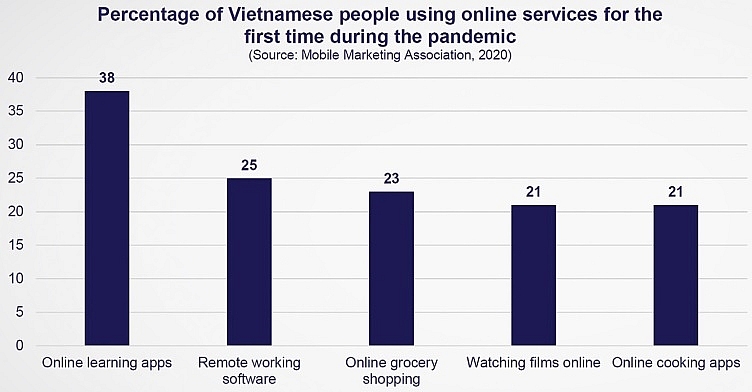Low-touch services possible solution?
 |
While the virus has been relatively well controlled in Vietnam, new cases in the community have once again raised the need for preventive social distancing measures. Continued social distancing measures may have a significant impact on Vietnam’s current economic structure and people’s social and purchasing behaviour in the years to come.
The pandemic is changing how we work, eat, shop, exercise, and spend our free time in ways that we have never expected before. Individuals and organisations should prepare for a low-touch economy now, as new ways of life and new practices emerge.
A low-touch economy would encourage and require limited close-contact interactions and gatherings during this time and beyond. This would ensure Vietnam follows the global trend which the country cannot afford to avoid as it must get ready for any future outbreaks.
One of the key preparations is to understand the types of activities that would be most affected and what business processes have potential to become more low-touch.
One proposed low-touch classification framework helps to categorise business activities in terms of how many people need to gather at one time and what level of close-contact interaction needs to take place. Low-touch businesses require no mass gatherings or many close-contact interactions with customers. This type of business has been doing well during the COVID-19 pandemic, with online shopping, education, entertainment, and cashless payments experiencing unprecedented growth both overseas and in Vietnam.
Accordingly, low-touch businesses can employ new digital technologies to deliver innovative care to customers while keeping everyone as safe as possible.
In contrast, high-touch groups require mass gatherings and high close-contact interactions, like in tourism and hospitality, and at conferences and traditional offices.
Strict social distancing policies and travel restrictions may lead to severe consequences for high-touch businesses if they do not introduce more low-touch activities.
Digital transformation across multiple industries has never been more pressing to ensure a smooth transition from high- to low-touch models, or even touchless business models. Meanwhile, touchless models provide highly digital interactions and personalised services without need to rely on close customers’ contact.
In response to COVID-19, Vietnamese businesses and government agencies have initiated many activities that aim to reduce high-touch points in the economy this year.
The nation’s Cashless Day on June 16 was dubbed as one such initiative. It was a joint project delivered by the State Bank of Vietnam, the Vietnam E-commerce Association, and National Payment Corporation of Vietnam. The pandemic also accelerated the government’s plans to provide selected online public services on multiple platforms (including phones) and online processing for most government documents by 2030.
A recent Mobile Marketing Association survey found that digital services have also experienced growth as many customers utilised online services for the first time during the pandemic. Consumer changes towards online interactions would spur businesses to invest more in digitalising their core processes. Many local organisations now view digitalisation as a key to sustained growth, and there is growing need for local sourcing and diversification of supply chain sources to ensure fewer disruptions in critical supply chains and less reliance on overseas suppliers.
What the stars mean:
★ Poor ★ ★ Promising ★★★ Good ★★★★ Very good ★★★★★ Exceptional
 Tag:
Tag:
Themes: Digital Transformation
- Dassault Systèmes and Nvidia to build platform powering virtual twins
- Sci-tech sector sees January revenue growth of 23 per cent
- Advanced semiconductor testing and packaging plant to become operational in 2027
- BIM and ISO 19650 seen as key to improving project efficiency
- Viettel starts construction of semiconductor chip production plant
Related Contents
Latest News
More News
- State corporations poised to drive 2026 growth (February 03, 2026 | 13:58)
- Why high-tech talent will define Vietnam’s growth (February 02, 2026 | 10:47)
- FMCG resilience amid varying storms (February 02, 2026 | 10:00)
- Customs reforms strengthen business confidence, support trade growth (February 01, 2026 | 08:20)
- Vietnam and US to launch sixth trade negotiation round (January 30, 2026 | 15:19)
- Digital publishing emerges as key growth driver in Vietnam (January 30, 2026 | 10:59)
- EVN signs key contract for Tri An hydropower expansion (January 30, 2026 | 10:57)
- Vietnam to lead trade growth in ASEAN (January 29, 2026 | 15:08)
- Carlsberg Vietnam delivers Lunar New Year support in central region (January 28, 2026 | 17:19)
- TikTok penalised $35,000 in Vietnam for consumer protection violations (January 28, 2026 | 17:15)






















 Mobile Version
Mobile Version